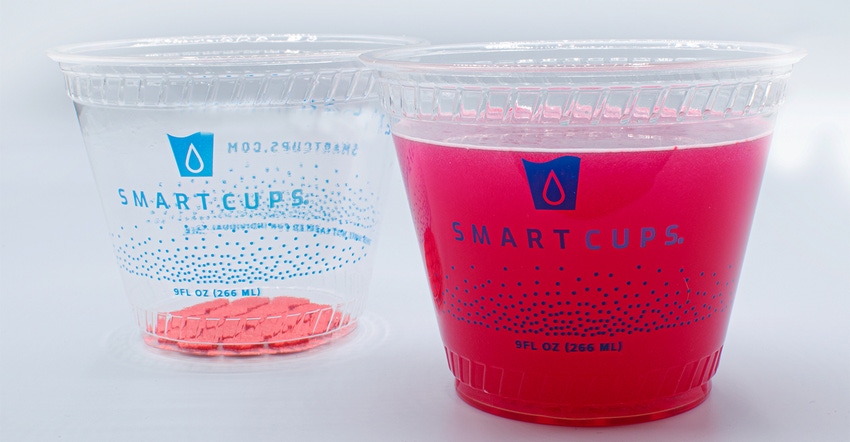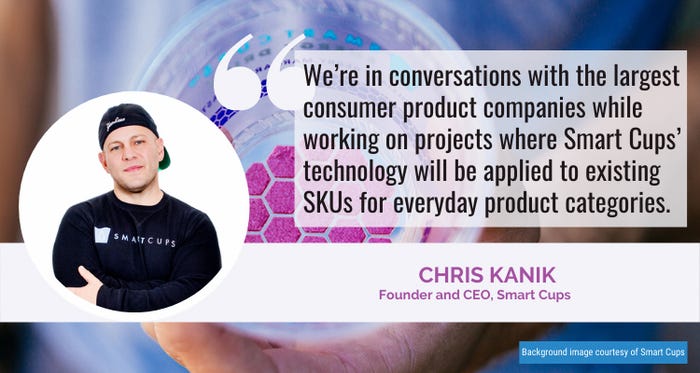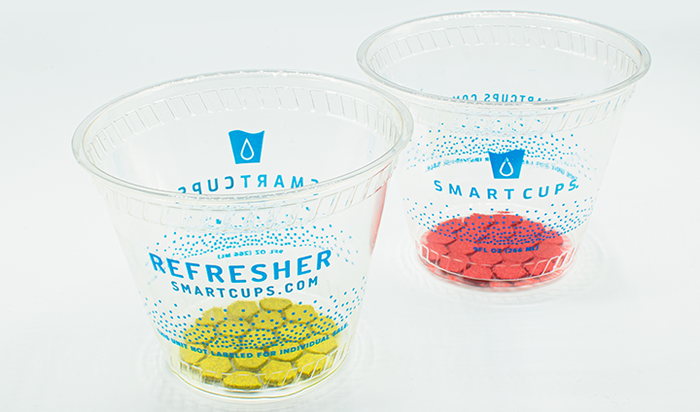Smart Cups Add a New Dimension to Printed Beverages
New technology permits ingredient printing on cup sidewalls, which will expand product and market capabilities to fuel growth for the “waterless beverages”.
March 2, 2021

A waterless beverage seems an oxymoron, but Smart Cups has made that incongruous concept a reality for optimized sustainable packaging. Billed as “the world’s first printed beverage,” the brand employs 20 and operates out of a 23,000 square foot facility in Mission Viejo, CA, and was the subject of a January 2020 interview with Packaging Digest.
Chris Kanik, chief excitement officer, aka founder and CEO, enthusiastically responded to a request for a 2021 progress report, which yielded answers referencing expectations he had a year ago as well as new plans.
As companies worldwide were blindsided by the pandemic then, Smart Cups also adjusted course over the ensuing months. However, the company has successfully weathered the storm and is positioned for dramatic growth driven by continued developments in technology and finding additional market opportunities.

What’s the state of Smart Cups these past months?
Kanik: When the COVID-19 pandemic began, we switched some of our production capabilities to produce hand sanitizer, helping fill a critical need for frontline workers. This also helped keep our employees working during a government-induced economic shutdown. We were able to produce and distribute more than 70,000 bottles of hand sanitizer to the Orange County Fire Authority, Orange County municipalities, local hospitals, first responders, veterinarians, and homeless shelters.
From a business perspective, I am very thankful to say that our sales have increased over the past year and we’ve increased consumer awareness through various announcements and partnerships.
You intended to add capacity and automation to increase your output this year, did that happen?
Kanik: The COVID-19 pandemic affected our supply chain and caused some delays from key parts’ manufacturers. That said, we have had successful tests of our increased production equipment and are expecting to have it all installed and implemented within the next few months.
This new method of printing will replace our current method and increase our capabilities from thousands to millions of cups.
Did you expand ingredient printing to the cup sidewall in addition to the cup bottom as planned?
Kanik: It will once our new system is implemented. With the ability to print on the cup sides and bottoms, we will have more surface area and can print more complex formulas, enhance flavor profiles, increase shelf life, and improve dissolve times.
As well, we will be able to print various types of materials and different cup sizes. We are all very excited about the future iteration of our manufacturing technology.
Did you change or add different cup substrates or sizes?
Kanik: In November 2020, we introduced our family-friendly and caffeine-free beverage option, Refreshers. The idea of Refreshers was inspired by my wife and children; we’re always on the go and are constantly looking for healthy options for our kids to enjoy. My kids have always wanted to try Smart Cups, but couldn’t because of the caffeine.
Perfect for families on the go, Smart Cups Refreshers have zero sugar, are naturally sweetened with Stevia, contain 5 calories, 1 carbohydrate, Vitamin C, Vitamin D, are vegan and eco-friendly. Refreshers are available in two exciting flavors, Strawberry Watermelon and Sour Apple.
Once our new printing system is implemented, we will expand our portfolio even more, by adding new flavor substrates and cup sizes, as well as print on various types of surfaces.
We’re also working on launching personal hygiene products, probiotics, some pain relief projects and are continuing to optimize our alcohol printing, which will all further solidify our goal of making sustainability at home possible.
Our current offerings are printed on polylactic acid (PLA) cups sourced from Fabri-Kal. Other materials will be coming within the next 12-24 months.

Were you able to secure the licensing agreements you sought?
Kanik: We are in conversations with some of the largest consumer product companies and are working on several projects where Smart Cups’ technology will be applied to their existing SKUs for a number of everyday product categories.
The sustainability value Smart Cups offers companies that are serious about their impact on the environment is incredibly impactful. Scientific research confirms that these sustainable practices would have a tremendously positive impact on the environment if Smart Cups’ technology becomes widely adopted throughout different industries. For example, a truck that can carry 96,000 cans of soda can instead carry 1.2 million Smart Cups, thanks to the stackable design and elimination of water in transportation. We’re hopeful to achieve adoption and commercialization by multinational companies within the next 18-24 months.
Did you see the demographic shift from female to male that you anticipated?
Kanik: Through 2020 and into 2021, we’ve seen that our core demographic remains women.
That said, we partnered with Mike Tyson ahead of his big fight this year which translated to an increase in male purchasers. Smart Cups serves world-class athletes, from boxing to surfing, rugby, football, basketball and beyond — so it’s exciting to see more and more men adopt Smart Cups.
Are there any plans to reach potential new markets such as hospitals, stadiums, schools, and cafeterias?
Kanik: Yes, we are planning to reach all these new markets in the near future. We are also looking at international markets as we continue to expand our reach.
Is there anything else happening this year?
Kanik: Stay tuned for exciting things from Smart Cups in 2021. We are committed to disrupting not just the beverage industry, but all consumer product industries by reimagining the way consumables are manufactured, packaged, and transported.
We’ve partnered with UCLA’s Institute of Environment and Sustainability to investigate how Smart Cups technology will impact the environment. According to that research, Smart Cups can ship a beverage volume of more than 600% compared to aluminum cans. This means Smart Cups is leading a very aggressive strategy to help the beverage industry reduce its transportation gas emissions by 40-fold, and to help reach the net-zero emissions status.
You May Also Like


